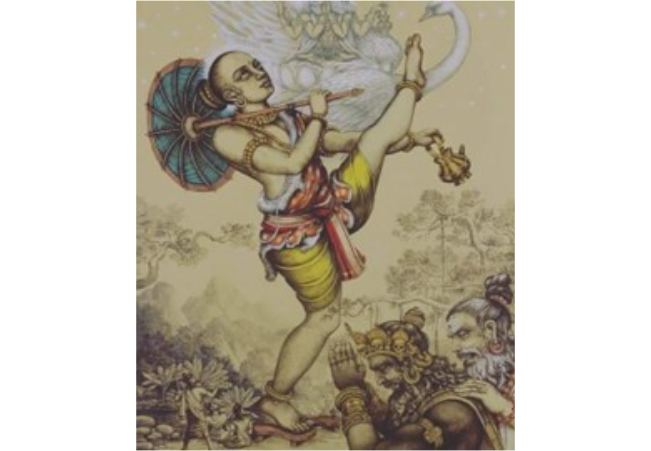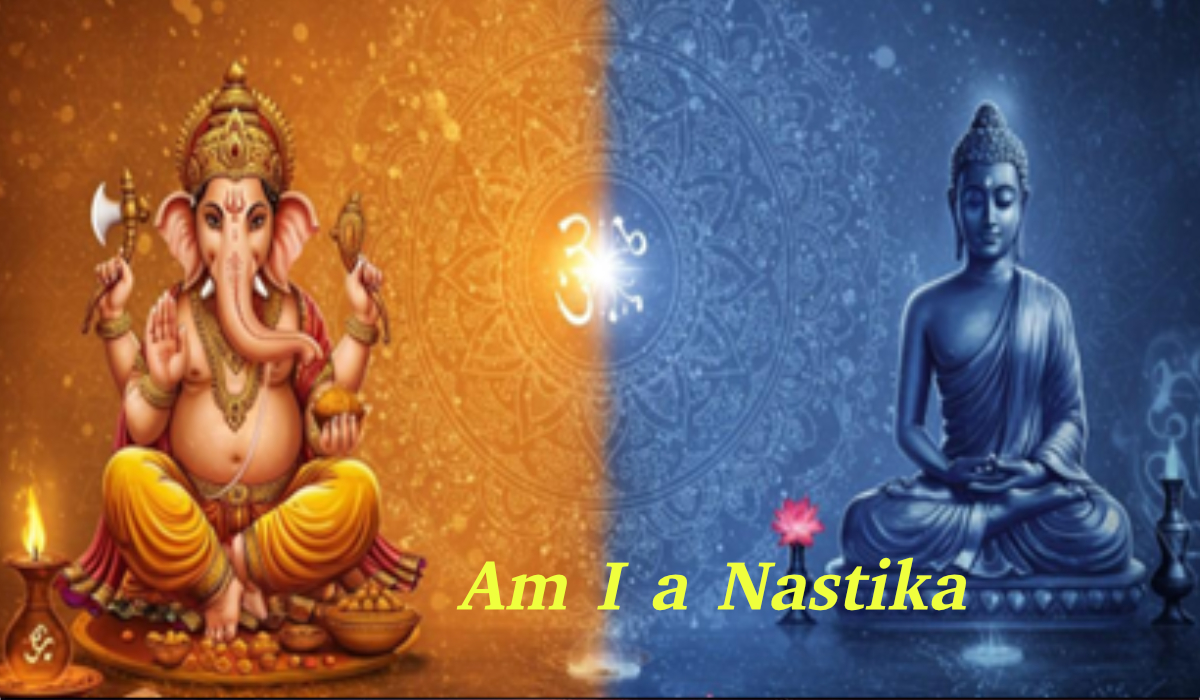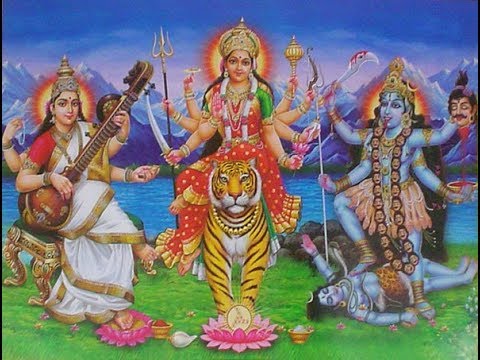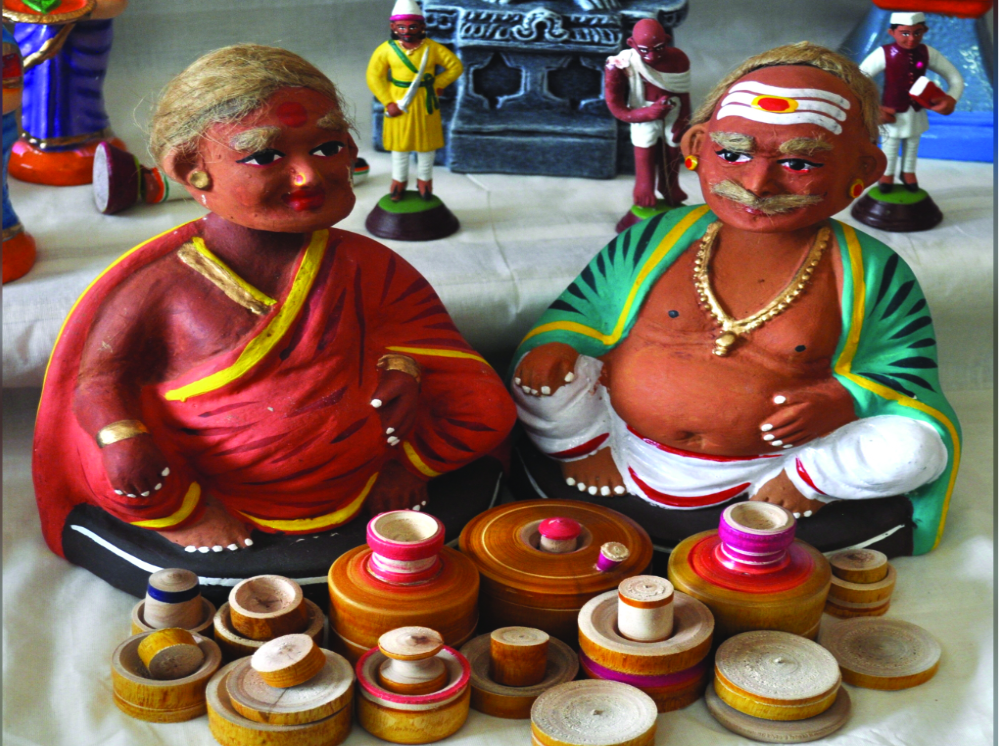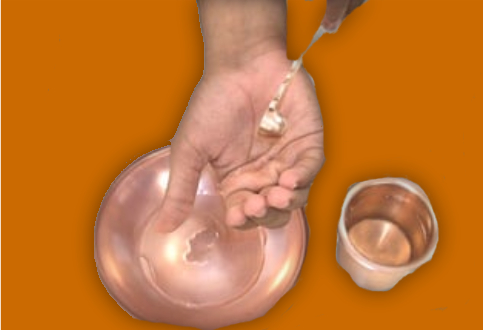37 – Thiruvonam
THIRUVONAM
Conversation With Aiya (37)
“Next Sunday, we are celebrating Onam, Ayya! As usual, a satsang conducted by Mitraseva! Can you come?”
I asked Ayya.
These days, it is rare to see him.
“Oh, I am happy! Satsang plays an important role in public service. Congratulations. What is the program for the day?”
“A small pooja, then singing, dancing, rangoli kolam, some things that everyone likes. Then a feat on banana-leaf!”
“Very good! Doing all this, that too in London also helps to spread our Dharma. It would be good if we could understand a little more about the reason for such a festival as Thiruvonam!”
“Yes, sir! We are celebrating Vāmana Jayanti, the incarnation day of the Supreme Lord Mahāvishnu. He is the one who came as a dwarf and destroyed the demon Mahābali!”
Ayya laughed.
“If you understand it superficially, how can the truth be clear? How can children answer intelligently when asked?”
I remained silent.
Ayya continued.
“It is not correct to mean ‘dwarf’ or an underdeveloped form by Vāmana! In Sanskrit, ‘Vāma’ means ‘one who captivates the mind’. Even ‘Krishna’ has the same meaning. Therefore, Vāmana has a captivating form. Since he had a Vāmana incarnation as a five-year-old child, it was also understood that he was a small form.”
“Sir, in Sanskrit, ‘vāma’ also means ‘left side’!”
“Yes. The manifestation of the divine power is on the left side of the Supreme Being, Ishwara! Even the Lord is seen as a form of power! That is why He is the Māyāvi, the Vāmana.”
“His incarnation was to destroy the demon Mahābali!”
“Not to destroy Mahābali! Rather, to bless Mahābali and bestow protection to him – To give him great positions!”
“How is that, sir! Most incarnations come to destroy the demon!”
“Incarnation, generally, is when the divine power comes in some form, to reestablish Dharma and instil jnānam, the true wisdom. Annihilating the demonic nature of beings is only a means to that noble end, not the main goal of avatārs!”
Ayya continued.
“Do you know what the terms ‘Asura’, ‘Sura’, and ‘Nara’ all mean?”
“Sir, Naran means human. Suran means celestial angel and Asura means a demon. Is that right?”
“Yes. But all this discrimination depends on how a wise human being realizes the incomparable power within him and how he uses it. Everyone knows that they can realize their infinite potential through various ways and means such as various forms of penance, yoga, and charity. By doing so, one can qualify to be deemed as Sura, Asura, or Nara. The difference among these is only on what and how they use their acquired strength.”
I was listening intently.
“The angels or demigods – Sura – serve Dharma, and live along the righteous path; and as returns, enjoy all the pleasures and positions of heavenly abodes.”
“Who is an Asura?” – I asked.
“He who uses his strength in a demonic way that is against Dharma, and relishes such evil life of existence.”
“That is why there is always war between the Asura and Sura, isn’t it!” – I said.
“Yes! Sura and Asura, do not give up their individuality, although they pursue their path along separate ways, one along the dharma and the other along adharma. The Puranas describe their duels and always, God comes to aid the Suras to secure their wins.”
“Sir, what does the Nara do?”
“We generally take the word ‘Nara’ to mean any human-being. But technically, the term should only mean the virtuous among the human-beings. Nara understands that there is a divine power that transcends both dharma and adharma, and possessed with the keen desire to realize himself as that divine power, by moving along the law of Dharma and Karma. That is why it is said that ‘Narajanmam durlabam’ – that it is rare to be born as a human being with knowledge and virtue.”
“Mahābali is a demon!”
“Yes! His father Virochana was a demon. Virochana’s father Prahlāda was a demon and his father Hiranyakasipu was a demon. That is a demon lineage!”
“Ayya! Then how did Prahlāda, a demon king, become a great devotee and a righteous person?”
“That was due to his good deeds. The discriminations among sura, asura, humans, and animals – all come only from their karma! That is why, the Lord granted compassion upon Prahlāda’s devotion, and took the form of Narasimha and destroyed Hiranyakasipu.”
I was listening.
“At that time, the Lord had promised Prahlāda that He would be the protector of his seven descendants!”
“Ayya! Then why did the Lord destroy Prahlāda’s grandson Mahābali?”
“Not destroyed! The Lord created a special world for him under the earth called ‘Sutala’ and made him its emperor, with Lord Himself as his protector.”
“Then Bali chakravathi did not perish, after all!”
“No! Every year during Thiruvonam, he comes to see the earth that he once ruled. The Lord has bestowed upon him such a boon.”
“How, sir?”
“The term ‘Mahābali’ means one who has great strength. With that strength, he subdued and ruled over everyone, both humans and gods. It was due to Mahābali, the gods were unable to perform their dhārmic duties. Therefore, Aditi, the mother of the gods beseeched the grace of Lord and as a result, the Lord Himself came to her as her son, in the form of five year old Vāmana.”
“Vāmana is a child, not a dwarf, right, sir!”
“Yes! A beautiful child. That is why Mahābali’s wife must have had a maternal desire to hold the child in her breast and breastfeed him. For that desire, she was born again as a demon ‘Bhutana’ and achieved her wish during the incarnation of Krishna.”
“My dear Ayya! Isn’t it a legend that Mahābali who granted the three feet of land that the Vāmana had asked for, and for that very reason, thrown away into the into the underworld by the Lord?”
“Almost! But it was a blessing. If God himself is coming to meet someone in incarnation, shouldn’t that person be of venerable qualities and merits! In Sanskrit, ‘Bāli’ also means ‘dedication’ and ‘sacrifice.’ Therefore, Mahābali represents a great sacrifice. Emperor Bali was such a great person, noble martyr.”
“Sir, is the ‘Bali Peetha’ in temples also a place for offering sacrifices?”
“Yes! When Vāmana came before Mahābali, as a King, he agreed to grant the wishes of the guest, Vāmana, as per the norms of the King. However when Vāmana asked for three feet of land measured with His small feet, the Emperor Mahābali did not think much of it and promised to give it. At that time, the demon- guru, Sukrāchārya, standing near-by, tried to prevent the king from doing so, yet, as a man of his words, Mahābali, committed to grant what he had promised. Then Vāmana, who took a large form as ‘Trivikrama’, measured all the lower worlds including the earth with one foot and all the heavens with the other foot. After that, what should be done with the third foot? He asked Mahābali about that.”
“Yes Ayya!, Emperor Bali at once gave his head. Didn’t the Lord press it with his foot?”
“Yes!”
“Ayya, if God measured everything including the earth in the first step, then within that step, won’t Mahābali’s head not be included? Then how could he offer his head again?”
Ayya said with a smile.
“Good question! The Purānas do not lie. If only we understand the truth embedded in them, we will understand its greatness. In this legend, the head of Mahābali represents the sacrifice of his ego. The ‘I’ consciousness transcends all worlds. That is why the ego of Mahābali was not caught in the first two steps of the Lord!”
“I don’t understand, Ayya! I am within this body. I am in this world. So, how can I be beyond all worlds?”
“It is common knowledge that I am within this body, and I am within this world! But on analysis, you will learn that it is ignorance! Aren’t you attending Vedanta classes!” – Sir mocked.
I remained silent.
“The world is the stage for your embodied experience. Actually, life is just ‘anubhava dhāra’ – a chain of experiences only. So there is a domain of experience – the world, the objects of experience – the world and the experiencer. Understand that the experiencer is the knowledge – nay – the consciousness that knows you’re your knowledge and ignorance!”
I was listening.
“Your inner consciousness is the source of all knowledge, the object of knowledge, and experience. That consciousness is the I which transcends all the worlds of experience.”
“What proof, sir?”
“Your life experiences are the proof. If you look closely, all your experiences take place in three domains of experiences – or the three worlds. This waking world – everything we talk about, everything we do etc is one. Then is your dream world – in which you create and experience many things within yourself.”
“The third?” – I asked.
“Your state of deep-sleep, where you are experiencing the darkness of ignorance.”
After a small but enthralling pause, Ayya said: “The ‘I’ is the Atma that is always shining as a witness to all those three worlds of experiences!”
“So, Did Mahābali offer his Atma in the symbolic gesture of giving his head?”
“No! Atma cannot be given or bought. It pervades all and fills everywhere. But we, out of ignorance, limits the effulgence of our consciousness with out established identities – for example, ‘I am Indian’, ‘male, rich, educated’ etc. The notion of I, thus have a form which is limited and utterly helpless. The symbolic offer of the head by Mahābali represents his offer of his ego.”
“Is the giving up of ego such a big sacrifice?”
“That alone is sacrifice! Nothing else is sacrifice!”
“What, Ayya! I do donate many things everyday!”
“What? What is yours to give away? What did you produce yourself? What is your creation? Nothing! How can you give something as your own, by changing what is never your own and making it your creation?”
Puzzled, I probed: “So is all donation a lie?”
“A lie indeed, but perhaps a good lie! If we practice giving like that, we eventually will feel humbled that we cannot really give anything of our own.”
“I understand, Sir! What else I can give!”
“Give what you have created! Your world of experience is what you have created yourself! Give it! As soon as you see someone, you make a judgment that he is bad etc – such judgemental approach creates your judgemental world – that is where you dwell. Sacrifice that creation of yours! Donate the ego of ‘I’, which is the cause of all this. That is the only thing that God did not create, but you created it yourself! That alone you can truly sacrifice! That sacrifice is the true surrender! That is what Mahābali did. That is why God readily granted his eternal protection.”
My whole mind was filled with an inexplicable silence and joy.
I hastened to ask.
“Ayya, please can you come to the Thiruvonam festival on Sunday?”
“No! Excuse me! Have a great time with your offer of banana-leaf feast to all! May you also serve the true import of Mahābali’s sacrifice.”
I stood for a few minutes, looking in the direction that Ayya was going.
Mee. Rajagopalan
10 Sep 2025
